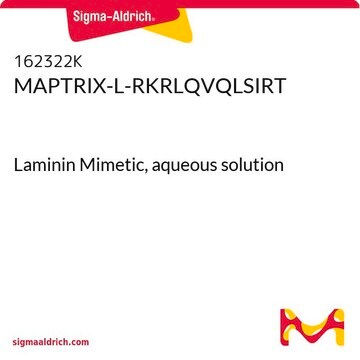推荐产品
無菌
Filtered sterilized solution
形狀
aqueous solution
分子量
~23.5 kDa
包裝
pkg of 2.5 mg
濃度
0.5 mg/mL protein
技術
cell culture | mammalian: suitable
結合特異性
Receptor: Heparin
Domain: β1 chain - F9
Binding Motif: RYVVLPR
運輸包裝
ambient
儲存溫度
2-8°C
應用
MAPTrix™ Technology provides a true extracellular microenvironment (ECM) by presenting combinatorial peptide motifs. The ECM, defined by biochemical cues and physical cues, is a deciding factor in a wide range of cellular processes including cell adhesion, proliferation, differentiation, and expression of phenotype-specific functions.Currently existing technology offers simple and merely adequate environments that facilitate simple cell processes such as cellular adhesion. The simple presentation of cell adhesion motifs is not optimal for controlling more integrated processes. Crosstalk among signaling pathways act synergistically to enhance cellular responses such as cell adhesion or proliferation. A study showed that a combination of extracellular matrix derived peptides presented on a surface may enhance cell adhesion strength and focal adhesion assembly. The combinatorial presentation of ECM peptides on cell growth surfaces may also promote elevated proliferation rates of primary or stem cells.
特點和優勢
- Biochemically-defined, animal-free cell culture surfaces designed to enhance cell performance
- MAPTrix™ produces a uniform ECM surface that provides a highly controlled 2D extracellular microenvironment for cell cultures and related applications
- Adhesion properties of the mussel adhesive protein makes the coating reproducible & reliable
法律資訊
MAPTrix is a trademark of Kollodis Biosciences
儲存類別代碼
10 - Combustible liquids
閃點(°F)
Not applicable
閃點(°C)
Not applicable
Stephanie J Ellis et al.
Cell and tissue research, 339(1), 121-130 (2009-07-10)
The regulation of stem cell behavior and maintenance typically involves the integration of both intrinsic and extrinsic cues. One such external cue, integrin-mediated cell adhesion to the extracellular matrix, plays an important part in regulating stem cell function and maintenance.
Samuel Schmidt et al.
Cell and tissue research, 339(1), 83-92 (2009-11-19)
Adhesion and migration are integrated cell functions that build, maintain and remodel the multicellular organism. In migrating cells, integrins are the main transmembrane receptors that provide dynamic interactions between extracellular ligands and actin cytoskeleton and signalling machineries. In parallel to
Seung Tae Lee et al.
Biomaterials, 31(6), 1219-1226 (2009-11-21)
We present development and use of a 3D synthetic extracellular matrix (ECM) analog with integrin-specific adhesion ligands to characterize the microenvironmental influences in embryonic stem cell (ESC) self-renewal. Transcriptional analysis of 24 integrin subunits followed by confirmation at the translational
S J Fashena et al.
Nature cell biology, 2(12), E225-E229 (2001-01-09)
Over the past twenty years, intensive research has enabled us to identify components of specific signalling pathways downstream of an array of adhesion and growth-factor receptors. The first Gordon Research Conference on 'Signalling by Adhesion Receptors', which took place in
Catherine D Reyes et al.
Journal of cellular physiology, 217(2), 450-458 (2008-07-10)
Cell adhesion to extracellular matrix (ECM) components through cell-surface integrin receptors is essential to the formation, maintenance and repair of numerous tissues, and therefore represents a central theme in the design of bioactive materials that successfully interface with the body.
我们的科学家团队拥有各种研究领域经验,包括生命科学、材料科学、化学合成、色谱、分析及许多其他领域.
联系技术服务部门








